BSC Business Management: Business Law Assignment, Semester 1, 2021/22
VerifiedAdded on 2023/06/07
|5
|2681
|374
Homework Assignment
AI Summary
This assignment provides a comprehensive overview of the UK legal system, including its classification into public and private law, and the three distinct legal jurisdictions within the UK. It delves into the four primary sources of law: legislation, case law, European law, and international human rights law, offering detailed descriptions and examples for each. The assignment further explores how these legal sources impact multilingual organizations. Additionally, it focuses on UK employment law, outlining its purpose of protecting workers' rights and promoting fair practices in the workplace. Specific employment laws, such as the National Minimum Wage Act 1998, the Maternity and Parental Leave Regulation 1999, the Equality Act 2010, the Health and Safety at Workplace Act 1974, and the Employment Relations Act 2004, are discussed, highlighting their significance in maintaining a balanced employer-employee relationship.
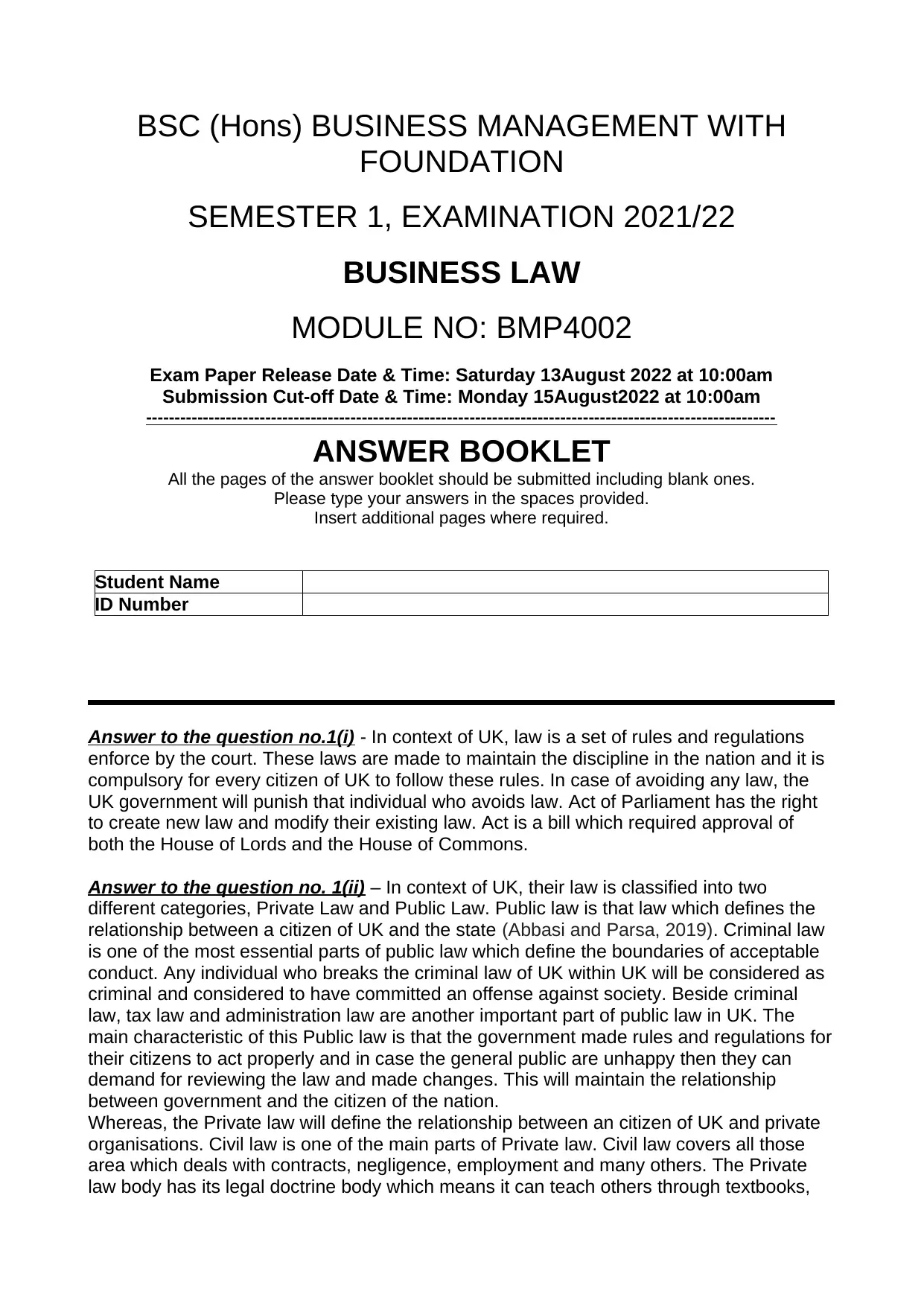
BSC (Hons) BUSINESS MANAGEMENT WITH
FOUNDATION
SEMESTER 1, EXAMINATION 2021/22
BUSINESS LAW
MODULE NO: BMP4002
Exam Paper Release Date & Time: Saturday 13August 2022 at 10:00am
Submission Cut-off Date & Time: Monday 15August2022 at 10:00am
---------------------------------------------------------------------------------------------------------------
ANSWER BOOKLET
All the pages of the answer booklet should be submitted including blank ones.
Please type your answers in the spaces provided.
Insert additional pages where required.
Student Name
ID Number
Answer to the question no.1(i) - In context of UK, law is a set of rules and regulations
enforce by the court. These laws are made to maintain the discipline in the nation and it is
compulsory for every citizen of UK to follow these rules. In case of avoiding any law, the
UK government will punish that individual who avoids law. Act of Parliament has the right
to create new law and modify their existing law. Act is a bill which required approval of
both the House of Lords and the House of Commons.
Answer to the question no. 1(ii) – In context of UK, their law is classified into two
different categories, Private Law and Public Law. Public law is that law which defines the
relationship between a citizen of UK and the state (Abbasi and Parsa, 2019). Criminal law
is one of the most essential parts of public law which define the boundaries of acceptable
conduct. Any individual who breaks the criminal law of UK within UK will be considered as
criminal and considered to have committed an offense against society. Beside criminal
law, tax law and administration law are another important part of public law in UK. The
main characteristic of this Public law is that the government made rules and regulations for
their citizens to act properly and in case the general public are unhappy then they can
demand for reviewing the law and made changes. This will maintain the relationship
between government and the citizen of the nation.
Whereas, the Private law will define the relationship between an citizen of UK and private
organisations. Civil law is one of the main parts of Private law. Civil law covers all those
area which deals with contracts, negligence, employment and many others. The Private
law body has its legal doctrine body which means it can teach others through textbooks,
FOUNDATION
SEMESTER 1, EXAMINATION 2021/22
BUSINESS LAW
MODULE NO: BMP4002
Exam Paper Release Date & Time: Saturday 13August 2022 at 10:00am
Submission Cut-off Date & Time: Monday 15August2022 at 10:00am
---------------------------------------------------------------------------------------------------------------
ANSWER BOOKLET
All the pages of the answer booklet should be submitted including blank ones.
Please type your answers in the spaces provided.
Insert additional pages where required.
Student Name
ID Number
Answer to the question no.1(i) - In context of UK, law is a set of rules and regulations
enforce by the court. These laws are made to maintain the discipline in the nation and it is
compulsory for every citizen of UK to follow these rules. In case of avoiding any law, the
UK government will punish that individual who avoids law. Act of Parliament has the right
to create new law and modify their existing law. Act is a bill which required approval of
both the House of Lords and the House of Commons.
Answer to the question no. 1(ii) – In context of UK, their law is classified into two
different categories, Private Law and Public Law. Public law is that law which defines the
relationship between a citizen of UK and the state (Abbasi and Parsa, 2019). Criminal law
is one of the most essential parts of public law which define the boundaries of acceptable
conduct. Any individual who breaks the criminal law of UK within UK will be considered as
criminal and considered to have committed an offense against society. Beside criminal
law, tax law and administration law are another important part of public law in UK. The
main characteristic of this Public law is that the government made rules and regulations for
their citizens to act properly and in case the general public are unhappy then they can
demand for reviewing the law and made changes. This will maintain the relationship
between government and the citizen of the nation.
Whereas, the Private law will define the relationship between an citizen of UK and private
organisations. Civil law is one of the main parts of Private law. Civil law covers all those
area which deals with contracts, negligence, employment and many others. The Private
law body has its legal doctrine body which means it can teach others through textbooks,
Paraphrase This Document
Need a fresh take? Get an instant paraphrase of this document with our AI Paraphraser
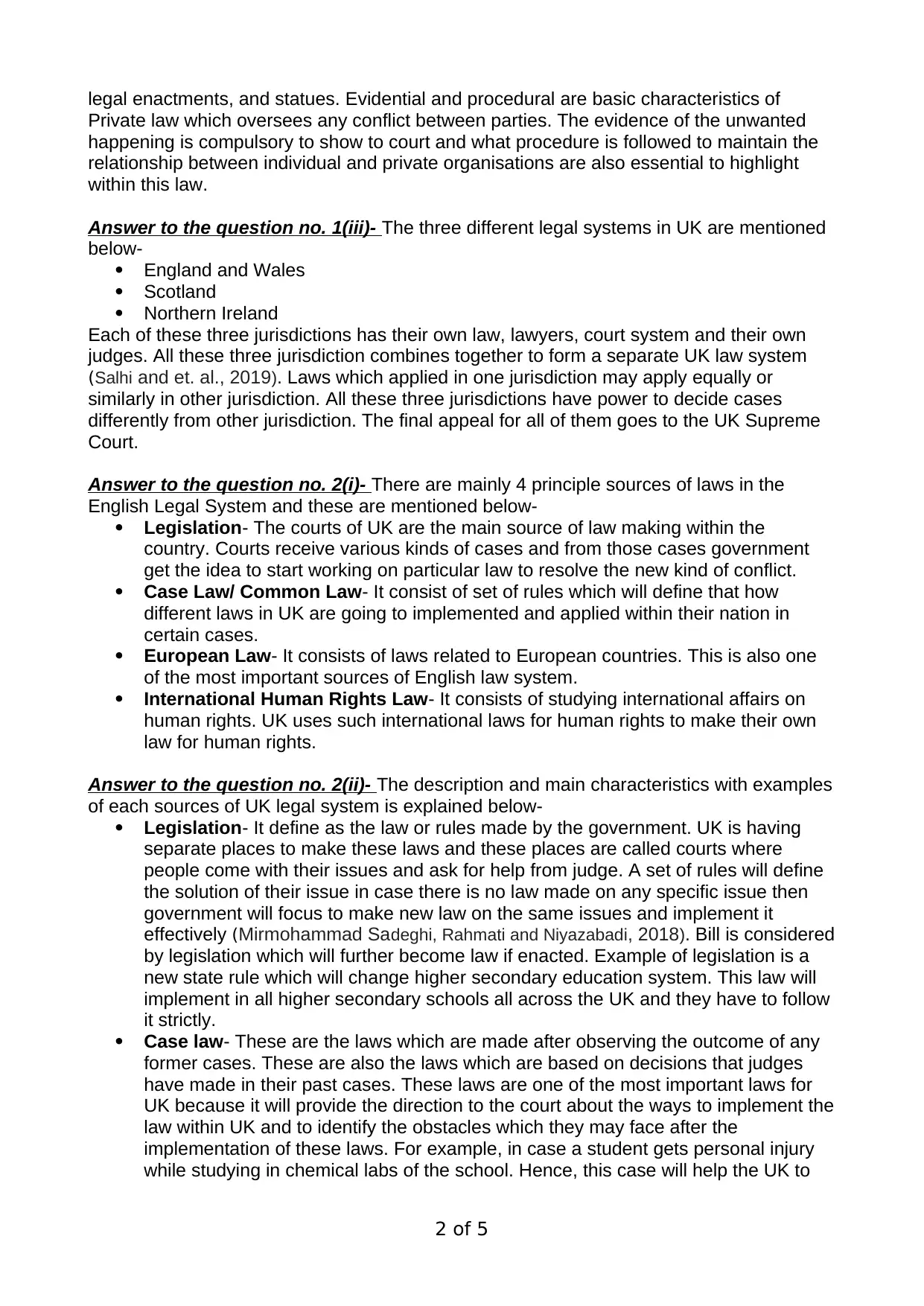
legal enactments, and statues. Evidential and procedural are basic characteristics of
Private law which oversees any conflict between parties. The evidence of the unwanted
happening is compulsory to show to court and what procedure is followed to maintain the
relationship between individual and private organisations are also essential to highlight
within this law.
Answer to the question no. 1(iii)- The three different legal systems in UK are mentioned
below-
England and Wales
Scotland
Northern Ireland
Each of these three jurisdictions has their own law, lawyers, court system and their own
judges. All these three jurisdiction combines together to form a separate UK law system
(Salhi and et. al., 2019). Laws which applied in one jurisdiction may apply equally or
similarly in other jurisdiction. All these three jurisdictions have power to decide cases
differently from other jurisdiction. The final appeal for all of them goes to the UK Supreme
Court.
Answer to the question no. 2(i)- There are mainly 4 principle sources of laws in the
English Legal System and these are mentioned below-
Legislation- The courts of UK are the main source of law making within the
country. Courts receive various kinds of cases and from those cases government
get the idea to start working on particular law to resolve the new kind of conflict.
Case Law/ Common Law- It consist of set of rules which will define that how
different laws in UK are going to implemented and applied within their nation in
certain cases.
European Law- It consists of laws related to European countries. This is also one
of the most important sources of English law system.
International Human Rights Law- It consists of studying international affairs on
human rights. UK uses such international laws for human rights to make their own
law for human rights.
Answer to the question no. 2(ii)- The description and main characteristics with examples
of each sources of UK legal system is explained below-
Legislation- It define as the law or rules made by the government. UK is having
separate places to make these laws and these places are called courts where
people come with their issues and ask for help from judge. A set of rules will define
the solution of their issue in case there is no law made on any specific issue then
government will focus to make new law on the same issues and implement it
effectively (Mirmohammad Sadeghi, Rahmati and Niyazabadi, 2018). Bill is considered
by legislation which will further become law if enacted. Example of legislation is a
new state rule which will change higher secondary education system. This law will
implement in all higher secondary schools all across the UK and they have to follow
it strictly.
Case law- These are the laws which are made after observing the outcome of any
former cases. These are also the laws which are based on decisions that judges
have made in their past cases. These laws are one of the most important laws for
UK because it will provide the direction to the court about the ways to implement the
law within UK and to identify the obstacles which they may face after the
implementation of these laws. For example, in case a student gets personal injury
while studying in chemical labs of the school. Hence, this case will help the UK to
2 of 5
Private law which oversees any conflict between parties. The evidence of the unwanted
happening is compulsory to show to court and what procedure is followed to maintain the
relationship between individual and private organisations are also essential to highlight
within this law.
Answer to the question no. 1(iii)- The three different legal systems in UK are mentioned
below-
England and Wales
Scotland
Northern Ireland
Each of these three jurisdictions has their own law, lawyers, court system and their own
judges. All these three jurisdiction combines together to form a separate UK law system
(Salhi and et. al., 2019). Laws which applied in one jurisdiction may apply equally or
similarly in other jurisdiction. All these three jurisdictions have power to decide cases
differently from other jurisdiction. The final appeal for all of them goes to the UK Supreme
Court.
Answer to the question no. 2(i)- There are mainly 4 principle sources of laws in the
English Legal System and these are mentioned below-
Legislation- The courts of UK are the main source of law making within the
country. Courts receive various kinds of cases and from those cases government
get the idea to start working on particular law to resolve the new kind of conflict.
Case Law/ Common Law- It consist of set of rules which will define that how
different laws in UK are going to implemented and applied within their nation in
certain cases.
European Law- It consists of laws related to European countries. This is also one
of the most important sources of English law system.
International Human Rights Law- It consists of studying international affairs on
human rights. UK uses such international laws for human rights to make their own
law for human rights.
Answer to the question no. 2(ii)- The description and main characteristics with examples
of each sources of UK legal system is explained below-
Legislation- It define as the law or rules made by the government. UK is having
separate places to make these laws and these places are called courts where
people come with their issues and ask for help from judge. A set of rules will define
the solution of their issue in case there is no law made on any specific issue then
government will focus to make new law on the same issues and implement it
effectively (Mirmohammad Sadeghi, Rahmati and Niyazabadi, 2018). Bill is considered
by legislation which will further become law if enacted. Example of legislation is a
new state rule which will change higher secondary education system. This law will
implement in all higher secondary schools all across the UK and they have to follow
it strictly.
Case law- These are the laws which are made after observing the outcome of any
former cases. These are also the laws which are based on decisions that judges
have made in their past cases. These laws are one of the most important laws for
UK because it will provide the direction to the court about the ways to implement the
law within UK and to identify the obstacles which they may face after the
implementation of these laws. For example, in case a student gets personal injury
while studying in chemical labs of the school. Hence, this case will help the UK to
2 of 5
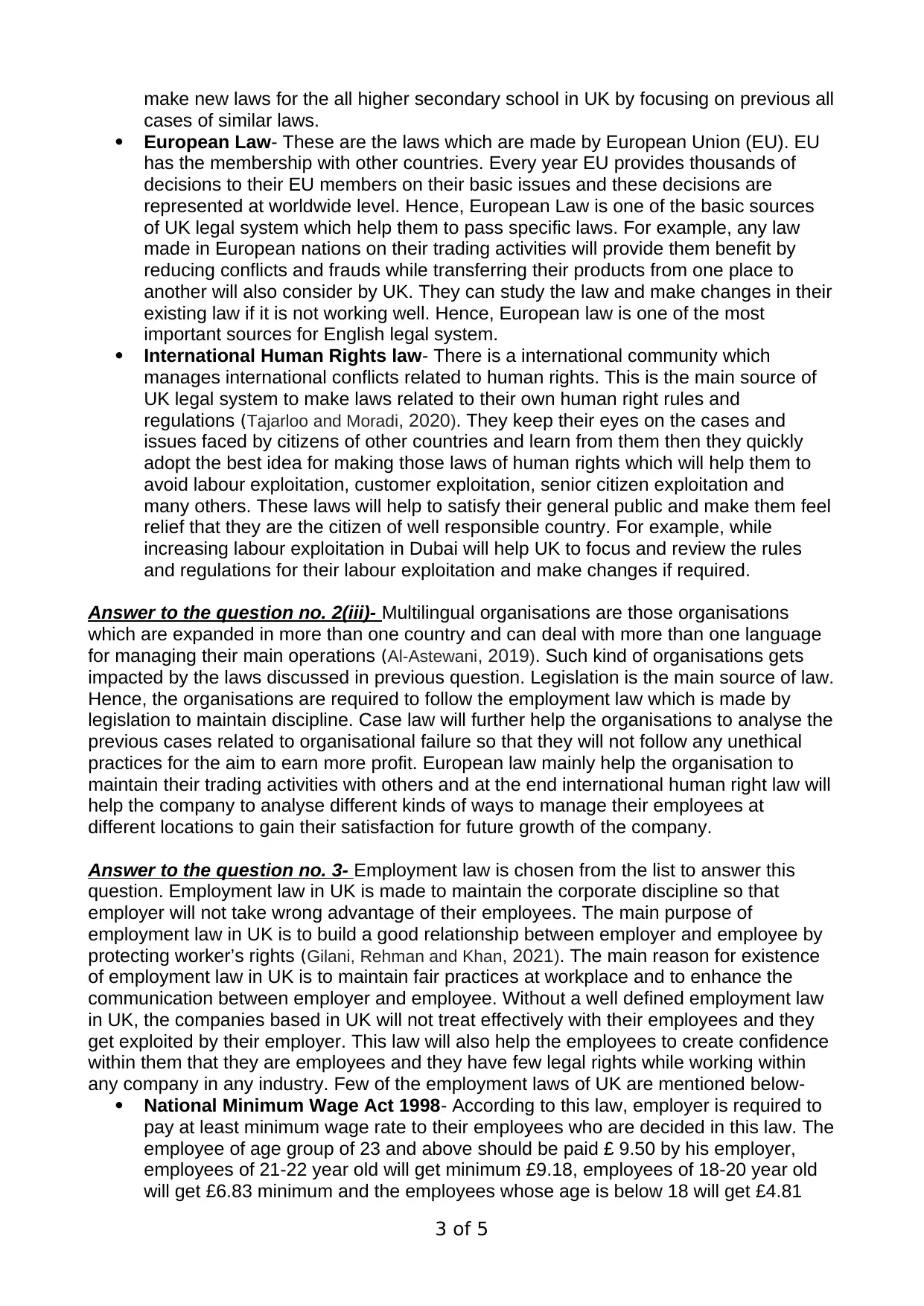
make new laws for the all higher secondary school in UK by focusing on previous all
cases of similar laws.
European Law- These are the laws which are made by European Union (EU). EU
has the membership with other countries. Every year EU provides thousands of
decisions to their EU members on their basic issues and these decisions are
represented at worldwide level. Hence, European Law is one of the basic sources
of UK legal system which help them to pass specific laws. For example, any law
made in European nations on their trading activities will provide them benefit by
reducing conflicts and frauds while transferring their products from one place to
another will also consider by UK. They can study the law and make changes in their
existing law if it is not working well. Hence, European law is one of the most
important sources for English legal system.
International Human Rights law- There is a international community which
manages international conflicts related to human rights. This is the main source of
UK legal system to make laws related to their own human right rules and
regulations (Tajarloo and Moradi, 2020). They keep their eyes on the cases and
issues faced by citizens of other countries and learn from them then they quickly
adopt the best idea for making those laws of human rights which will help them to
avoid labour exploitation, customer exploitation, senior citizen exploitation and
many others. These laws will help to satisfy their general public and make them feel
relief that they are the citizen of well responsible country. For example, while
increasing labour exploitation in Dubai will help UK to focus and review the rules
and regulations for their labour exploitation and make changes if required.
Answer to the question no. 2(iii)- Multilingual organisations are those organisations
which are expanded in more than one country and can deal with more than one language
for managing their main operations (Al-Astewani, 2019). Such kind of organisations gets
impacted by the laws discussed in previous question. Legislation is the main source of law.
Hence, the organisations are required to follow the employment law which is made by
legislation to maintain discipline. Case law will further help the organisations to analyse the
previous cases related to organisational failure so that they will not follow any unethical
practices for the aim to earn more profit. European law mainly help the organisation to
maintain their trading activities with others and at the end international human right law will
help the company to analyse different kinds of ways to manage their employees at
different locations to gain their satisfaction for future growth of the company.
Answer to the question no. 3- Employment law is chosen from the list to answer this
question. Employment law in UK is made to maintain the corporate discipline so that
employer will not take wrong advantage of their employees. The main purpose of
employment law in UK is to build a good relationship between employer and employee by
protecting worker’s rights (Gilani, Rehman and Khan, 2021). The main reason for existence
of employment law in UK is to maintain fair practices at workplace and to enhance the
communication between employer and employee. Without a well defined employment law
in UK, the companies based in UK will not treat effectively with their employees and they
get exploited by their employer. This law will also help the employees to create confidence
within them that they are employees and they have few legal rights while working within
any company in any industry. Few of the employment laws of UK are mentioned below-
National Minimum Wage Act 1998- According to this law, employer is required to
pay at least minimum wage rate to their employees who are decided in this law. The
employee of age group of 23 and above should be paid £ 9.50 by his employer,
employees of 21-22 year old will get minimum £9.18, employees of 18-20 year old
will get £6.83 minimum and the employees whose age is below 18 will get £4.81
3 of 5
cases of similar laws.
European Law- These are the laws which are made by European Union (EU). EU
has the membership with other countries. Every year EU provides thousands of
decisions to their EU members on their basic issues and these decisions are
represented at worldwide level. Hence, European Law is one of the basic sources
of UK legal system which help them to pass specific laws. For example, any law
made in European nations on their trading activities will provide them benefit by
reducing conflicts and frauds while transferring their products from one place to
another will also consider by UK. They can study the law and make changes in their
existing law if it is not working well. Hence, European law is one of the most
important sources for English legal system.
International Human Rights law- There is a international community which
manages international conflicts related to human rights. This is the main source of
UK legal system to make laws related to their own human right rules and
regulations (Tajarloo and Moradi, 2020). They keep their eyes on the cases and
issues faced by citizens of other countries and learn from them then they quickly
adopt the best idea for making those laws of human rights which will help them to
avoid labour exploitation, customer exploitation, senior citizen exploitation and
many others. These laws will help to satisfy their general public and make them feel
relief that they are the citizen of well responsible country. For example, while
increasing labour exploitation in Dubai will help UK to focus and review the rules
and regulations for their labour exploitation and make changes if required.
Answer to the question no. 2(iii)- Multilingual organisations are those organisations
which are expanded in more than one country and can deal with more than one language
for managing their main operations (Al-Astewani, 2019). Such kind of organisations gets
impacted by the laws discussed in previous question. Legislation is the main source of law.
Hence, the organisations are required to follow the employment law which is made by
legislation to maintain discipline. Case law will further help the organisations to analyse the
previous cases related to organisational failure so that they will not follow any unethical
practices for the aim to earn more profit. European law mainly help the organisation to
maintain their trading activities with others and at the end international human right law will
help the company to analyse different kinds of ways to manage their employees at
different locations to gain their satisfaction for future growth of the company.
Answer to the question no. 3- Employment law is chosen from the list to answer this
question. Employment law in UK is made to maintain the corporate discipline so that
employer will not take wrong advantage of their employees. The main purpose of
employment law in UK is to build a good relationship between employer and employee by
protecting worker’s rights (Gilani, Rehman and Khan, 2021). The main reason for existence
of employment law in UK is to maintain fair practices at workplace and to enhance the
communication between employer and employee. Without a well defined employment law
in UK, the companies based in UK will not treat effectively with their employees and they
get exploited by their employer. This law will also help the employees to create confidence
within them that they are employees and they have few legal rights while working within
any company in any industry. Few of the employment laws of UK are mentioned below-
National Minimum Wage Act 1998- According to this law, employer is required to
pay at least minimum wage rate to their employees who are decided in this law. The
employee of age group of 23 and above should be paid £ 9.50 by his employer,
employees of 21-22 year old will get minimum £9.18, employees of 18-20 year old
will get £6.83 minimum and the employees whose age is below 18 will get £4.81
3 of 5
⊘ This is a preview!⊘
Do you want full access?
Subscribe today to unlock all pages.

Trusted by 1+ million students worldwide
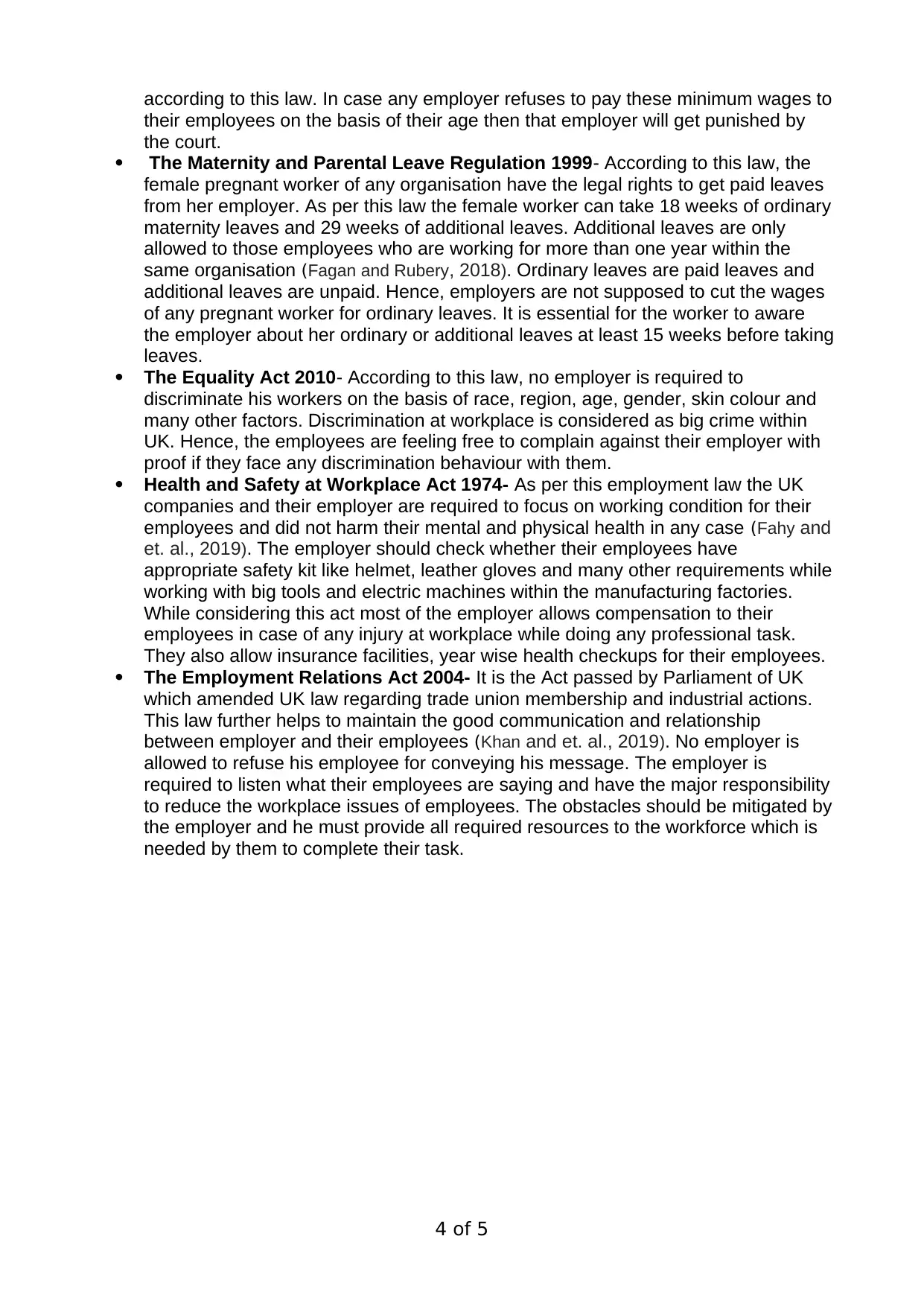
according to this law. In case any employer refuses to pay these minimum wages to
their employees on the basis of their age then that employer will get punished by
the court.
The Maternity and Parental Leave Regulation 1999- According to this law, the
female pregnant worker of any organisation have the legal rights to get paid leaves
from her employer. As per this law the female worker can take 18 weeks of ordinary
maternity leaves and 29 weeks of additional leaves. Additional leaves are only
allowed to those employees who are working for more than one year within the
same organisation (Fagan and Rubery, 2018). Ordinary leaves are paid leaves and
additional leaves are unpaid. Hence, employers are not supposed to cut the wages
of any pregnant worker for ordinary leaves. It is essential for the worker to aware
the employer about her ordinary or additional leaves at least 15 weeks before taking
leaves.
The Equality Act 2010- According to this law, no employer is required to
discriminate his workers on the basis of race, region, age, gender, skin colour and
many other factors. Discrimination at workplace is considered as big crime within
UK. Hence, the employees are feeling free to complain against their employer with
proof if they face any discrimination behaviour with them.
Health and Safety at Workplace Act 1974- As per this employment law the UK
companies and their employer are required to focus on working condition for their
employees and did not harm their mental and physical health in any case (Fahy and
et. al., 2019). The employer should check whether their employees have
appropriate safety kit like helmet, leather gloves and many other requirements while
working with big tools and electric machines within the manufacturing factories.
While considering this act most of the employer allows compensation to their
employees in case of any injury at workplace while doing any professional task.
They also allow insurance facilities, year wise health checkups for their employees.
The Employment Relations Act 2004- It is the Act passed by Parliament of UK
which amended UK law regarding trade union membership and industrial actions.
This law further helps to maintain the good communication and relationship
between employer and their employees (Khan and et. al., 2019). No employer is
allowed to refuse his employee for conveying his message. The employer is
required to listen what their employees are saying and have the major responsibility
to reduce the workplace issues of employees. The obstacles should be mitigated by
the employer and he must provide all required resources to the workforce which is
needed by them to complete their task.
4 of 5
their employees on the basis of their age then that employer will get punished by
the court.
The Maternity and Parental Leave Regulation 1999- According to this law, the
female pregnant worker of any organisation have the legal rights to get paid leaves
from her employer. As per this law the female worker can take 18 weeks of ordinary
maternity leaves and 29 weeks of additional leaves. Additional leaves are only
allowed to those employees who are working for more than one year within the
same organisation (Fagan and Rubery, 2018). Ordinary leaves are paid leaves and
additional leaves are unpaid. Hence, employers are not supposed to cut the wages
of any pregnant worker for ordinary leaves. It is essential for the worker to aware
the employer about her ordinary or additional leaves at least 15 weeks before taking
leaves.
The Equality Act 2010- According to this law, no employer is required to
discriminate his workers on the basis of race, region, age, gender, skin colour and
many other factors. Discrimination at workplace is considered as big crime within
UK. Hence, the employees are feeling free to complain against their employer with
proof if they face any discrimination behaviour with them.
Health and Safety at Workplace Act 1974- As per this employment law the UK
companies and their employer are required to focus on working condition for their
employees and did not harm their mental and physical health in any case (Fahy and
et. al., 2019). The employer should check whether their employees have
appropriate safety kit like helmet, leather gloves and many other requirements while
working with big tools and electric machines within the manufacturing factories.
While considering this act most of the employer allows compensation to their
employees in case of any injury at workplace while doing any professional task.
They also allow insurance facilities, year wise health checkups for their employees.
The Employment Relations Act 2004- It is the Act passed by Parliament of UK
which amended UK law regarding trade union membership and industrial actions.
This law further helps to maintain the good communication and relationship
between employer and their employees (Khan and et. al., 2019). No employer is
allowed to refuse his employee for conveying his message. The employer is
required to listen what their employees are saying and have the major responsibility
to reduce the workplace issues of employees. The obstacles should be mitigated by
the employer and he must provide all required resources to the workforce which is
needed by them to complete their task.
4 of 5
Paraphrase This Document
Need a fresh take? Get an instant paraphrase of this document with our AI Paraphraser
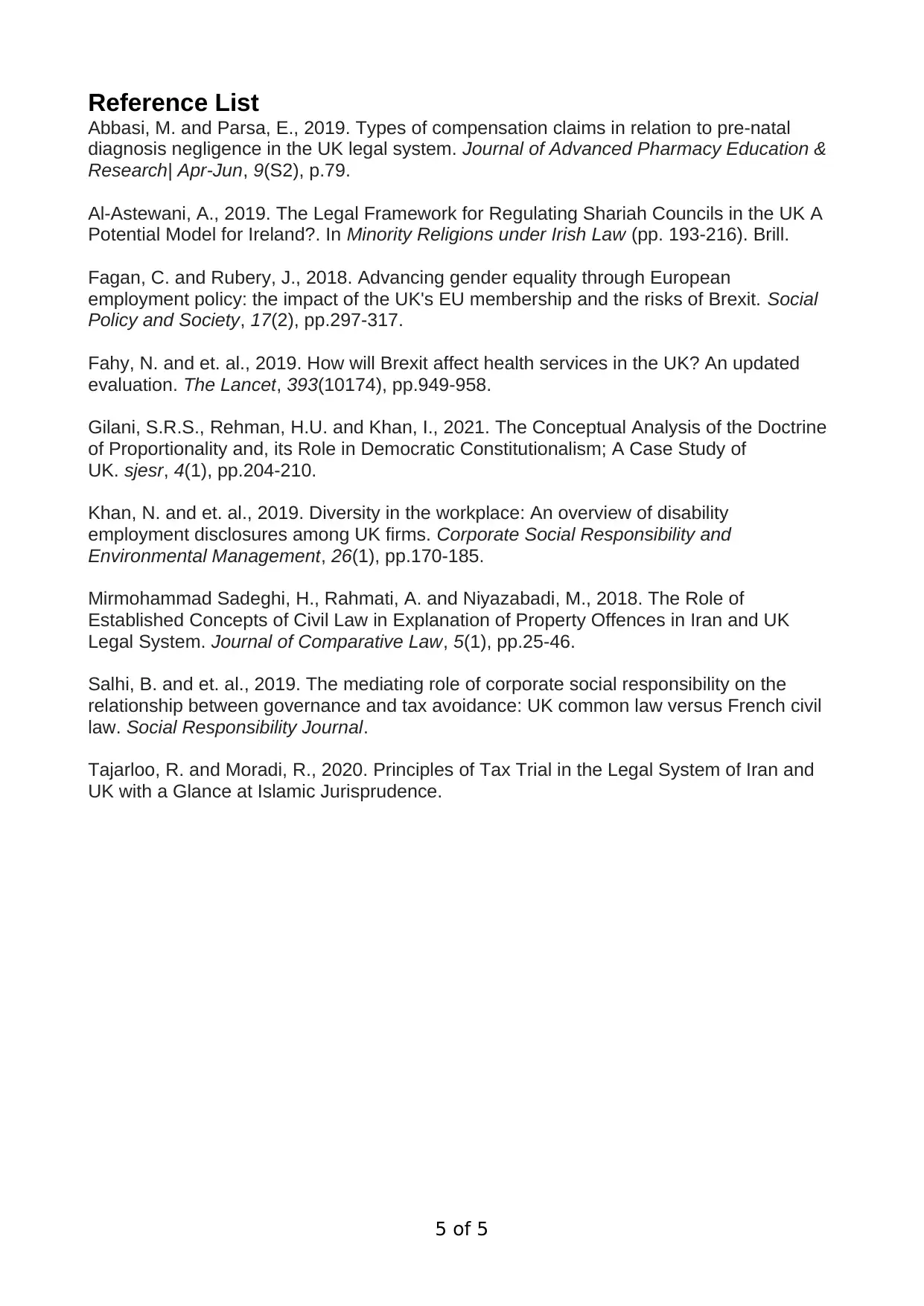
Reference List
Abbasi, M. and Parsa, E., 2019. Types of compensation claims in relation to pre-natal
diagnosis negligence in the UK legal system. Journal of Advanced Pharmacy Education &
Research| Apr-Jun, 9(S2), p.79.
Al-Astewani, A., 2019. The Legal Framework for Regulating Shariah Councils in the UK A
Potential Model for Ireland?. In Minority Religions under Irish Law (pp. 193-216). Brill.
Fagan, C. and Rubery, J., 2018. Advancing gender equality through European
employment policy: the impact of the UK's EU membership and the risks of Brexit. Social
Policy and Society, 17(2), pp.297-317.
Fahy, N. and et. al., 2019. How will Brexit affect health services in the UK? An updated
evaluation. The Lancet, 393(10174), pp.949-958.
Gilani, S.R.S., Rehman, H.U. and Khan, I., 2021. The Conceptual Analysis of the Doctrine
of Proportionality and, its Role in Democratic Constitutionalism; A Case Study of
UK. sjesr, 4(1), pp.204-210.
Khan, N. and et. al., 2019. Diversity in the workplace: An overview of disability
employment disclosures among UK firms. Corporate Social Responsibility and
Environmental Management, 26(1), pp.170-185.
Mirmohammad Sadeghi, H., Rahmati, A. and Niyazabadi, M., 2018. The Role of
Established Concepts of Civil Law in Explanation of Property Offences in Iran and UK
Legal System. Journal of Comparative Law, 5(1), pp.25-46.
Salhi, B. and et. al., 2019. The mediating role of corporate social responsibility on the
relationship between governance and tax avoidance: UK common law versus French civil
law. Social Responsibility Journal.
Tajarloo, R. and Moradi, R., 2020. Principles of Tax Trial in the Legal System of Iran and
UK with a Glance at Islamic Jurisprudence.
5 of 5
Abbasi, M. and Parsa, E., 2019. Types of compensation claims in relation to pre-natal
diagnosis negligence in the UK legal system. Journal of Advanced Pharmacy Education &
Research| Apr-Jun, 9(S2), p.79.
Al-Astewani, A., 2019. The Legal Framework for Regulating Shariah Councils in the UK A
Potential Model for Ireland?. In Minority Religions under Irish Law (pp. 193-216). Brill.
Fagan, C. and Rubery, J., 2018. Advancing gender equality through European
employment policy: the impact of the UK's EU membership and the risks of Brexit. Social
Policy and Society, 17(2), pp.297-317.
Fahy, N. and et. al., 2019. How will Brexit affect health services in the UK? An updated
evaluation. The Lancet, 393(10174), pp.949-958.
Gilani, S.R.S., Rehman, H.U. and Khan, I., 2021. The Conceptual Analysis of the Doctrine
of Proportionality and, its Role in Democratic Constitutionalism; A Case Study of
UK. sjesr, 4(1), pp.204-210.
Khan, N. and et. al., 2019. Diversity in the workplace: An overview of disability
employment disclosures among UK firms. Corporate Social Responsibility and
Environmental Management, 26(1), pp.170-185.
Mirmohammad Sadeghi, H., Rahmati, A. and Niyazabadi, M., 2018. The Role of
Established Concepts of Civil Law in Explanation of Property Offences in Iran and UK
Legal System. Journal of Comparative Law, 5(1), pp.25-46.
Salhi, B. and et. al., 2019. The mediating role of corporate social responsibility on the
relationship between governance and tax avoidance: UK common law versus French civil
law. Social Responsibility Journal.
Tajarloo, R. and Moradi, R., 2020. Principles of Tax Trial in the Legal System of Iran and
UK with a Glance at Islamic Jurisprudence.
5 of 5
1 out of 5
Related Documents
Your All-in-One AI-Powered Toolkit for Academic Success.
+13062052269
info@desklib.com
Available 24*7 on WhatsApp / Email
![[object Object]](/_next/static/media/star-bottom.7253800d.svg)
Unlock your academic potential
Copyright © 2020–2026 A2Z Services. All Rights Reserved. Developed and managed by ZUCOL.


